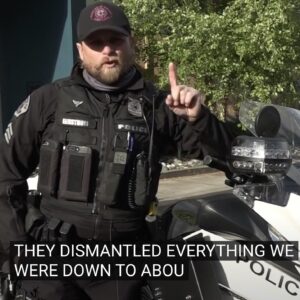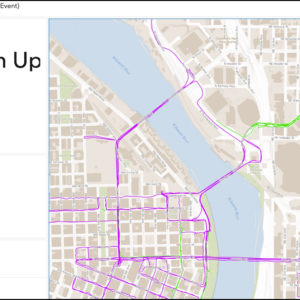The Transportation Options division within PDOT has put out a call to marketing and focus group experts to help create and evaluate effective messages that will resonate with the non-cycling public.
This effort is a key part of their nine-point strategy to reach Platinum status with the League of Amercian Bicyclists and increase bicycle use by 15%.
According to the official request for proposals,
“The goal of this research is to provide the City of Portland’s Bicycle Platinum team with current information to assist with planning and policy-making for increasing bicycle ridership in the city of Portland. Up to date information focused on the central city area of Portland is needed to craft marketing and to make policy decisions to reach Platinum Portland goals.”
The City wants to move beyond existing cyclists and find out the barriers and excuses that prevent the majority of Portlanders from riding. They want to,
“get beyond the “socially acceptable” responses and buzz words to understanding city residents’ attitudes about bicycling and the motivations underlying those attitudes.”
PDOT’s Linda Ginenthal says,
“First, we need to know how to encourage them to think about riding a bicycle, then we’ve got to get them to do it.”
Ginenthal and her colleagues hope the results of this work will create a national model that can be used by other cities. Work is expected to be completed by the end of December.







Thanks for reading.
BikePortland has served this community with independent community journalism since 2005. We rely on subscriptions from readers like you to survive. Your financial support is vital in keeping this valuable resource alive and well.
Please subscribe today to strengthen and expand our work.
It looks like, on the website, that Roger and Jeff are the only ones with emails posted. Is Linda spearheading this and if so what’s her email?
What do they consider the “central city area of Portland”?
I’m still waiting for PDOT to roll out a serious motorist education campaign. At the Bike Summit they admitted that this was a weak point in their education efforts. Can anyone speak to this issue?
The issues of having to change into work attire with no place to change or keep one’s clothes and also the need that some have for a shower are definitely hurdles for many.
If employers and building owners provided adequate bike parking and lockers (or locker rooms!) it would help. I’m not convinced employers and building owners actually support bike commuting, as some like to espouse – that’s marketing for you.
For instance, The Oregonian (despite being a good employer – who also provides lockers and showers) has not been a sponsor of the Bike Commute Challenge. A lot of people who work there, bike commute. The publisher, octogenarian, Corvette driving, Fred Stickel, has been heard saying he resented providing FREE parking to bicyclists in their garage.
Additionally, I have personally had no luck getting an adequate bike rack in the 10-story bldg that I work in downtown. It has a huge SPACIOUS 3-level garage with a circa 1960 bike rack. You know, the kind the elementary school students used back then. The bldg is owned by Portland developer Joseph E. Weston and run by American Property Mgmt (also owned by Joe Weston).
After not getting any response from APM, I enlisted PDOT’s help. The APM building manager did not return PDOT’s call(s) either.
After requesting from PDOT an update on this particular matter, PDOT responded via email that because the bldg. is a 1970s model, bike parking is not required and they are not violating any code. (True, so?) The PDOT employee also wrote, “we are not in the business of pestering building owners.”
In summary, I detest marketing campaigns. Think of all the BS we have to contend with in this world because people can’t be direct and honest. They have to brainwash us into believing a certain thing or fool us into buying their crummy product.
If we have to trick people into biking, to hell with it. Screw the marketing BS. JUST DO IT! I know it’s a novel idea, but actually MAKE biking easier. Insist that building owners provide adequate and sufficient biking spaces. Insist that employers accomodate bikers. JUST DO IT.
Doormat writes: >>If we have to trick people into biking, to hell with it. Screw the marketing BS. JUST DO IT! I know it’s a novel idea, but actually MAKE biking easier. Insist that building owners provide adequate and sufficient biking spaces. Insist that employers accomodate bikers…
I’m with Doormat on this one. It’s not up to us in the pro-bicycle industries to make cycling more attractive to would-be riders; it’s up to the business community and city planners to make the changes that would allow for safer, friendlier bicycling in Portland and everywhere, whether it’s by re-designing our streets and neighborhoods or by accommodating the growing numbers of bike commuters by providing amenities for them.
Asking people who don’t bicycle what their excuses are for not bicycling, and then trying to address those excuses, is a waste of time. Why? Because the non-bicyclists will simply come up with new excuses.
A better idea is to ask the people who are actually bicycling what they like, what works for them, and what shortcomings exist for bicycling in the current transportation system. Then fix the shortcomings.
I’m not sure how to decide which shortcomings to fix first, though. I have a utopian fantasy that each bicycle rider would earn one vote for bicycle transportation improvements for each mile s/he rides each year. In an annual election, each rider would then distribute however many votes for whatever projects most interest him/her. So my 3000 or so votes would go to fixing the Beaverton-Hillsdale/Oleson/Scholls Ferry intersection. Your 5000 votes might go to the missing gaps on Barbur Blvd. Someone else’s 2000 votes might be split between bike boulevards in various locations, and bike paths on Skyline.
The reason it’s a utopian idea is that I don’t know how you keep people from cheating and claiming more miles than they actually rode. And I’m sure that someone could make an argument that votes per mile ridden is unfair, that it should be one person one vote, or one tax dollar one vote, etc., etc.
A major publicity idea would be to educate the motorized public about the REALITY of their decision.
Autos are the highest cause of death for everyone under 30.
10,000 bicycles cause the same damage to city roads that a single car does (unsubstantiated).
30% of all police responses are for traffic (not murder, robbery, assault, etc)
A single autmobile requires as much road space as 50 bicycles.
Property taxes pay for 60% of the cost of roads (so regarless of mode, we all subsidize driving).
This might guilt some people into changing.
I think we need to take another tack here. It won’t be easy for some to swallow but I feel it would be far more effective than the old soft sell we’ve come to expect.
First, forget educating the current crop of drivers. You will never reach enough minds via PSA, extra bike questions on DMV tests, signs, etc. Drivers are set in their ways and truly believe they own the roadways. The better solution is to create a legal atmosphere where drivers can and will face serious criminal / civil charges for negligence that causes injury or fatality. You start drilling that into people’s heads and you will see a shift in attitudes about lane sharing. Be warned this will take years as new drivers will be most receptive and this would be incorporated into driver’s ed programs.
Secondly, boost bike (and mass transit) ridership via a campaign that promotes sustainability and alternative transportation usage as “The New Patriotism”. This will be somewhat controversial because it will fly in the face of PC attitudes we have today. The message sent is that fitness, health, breaking dependence on oil, and reducing carbon emissions is what “good citizens” do. To that end, people are encouraged and praised for commuting and running errands on bikes, walking, and using mass transit rather than driving.
Emphasize that leaving your car behind saves money and shaves weight thus, stimulates the economy through spending on non-oil products and lowers health care costs. Roads have to be fixed less often and that frees up state money for schools and social programs. Rile people’s egos by stating that real men and strong women don’t need cars. For the more left leaning, here’s your chance to change America for the better, screw big oil, and the neocons with one simple change in lifestyle!
Will this piss off the establishment? Obese people? Lazy and pampered folks? Absolutely. But I think that Portland is the perfect proving ground for such a plan. We must face the fact that “Biking is FUN!” is tired and won’t get people out of their plush SUVs on a cold February day. But shame might. National pride might. Being praised as a patriot might. If we get a few thousand more bikes out on our streets each day, they become more visible and the pressure builds for more to join them. Get enough out there, perhaps the traffic laws change on residential and low speed city streets to accomodate bikes. Perhaps we will eventually get the same rights as motorcycles. (Ride two abreast in the lane and cars must follow at OUR speed – we ARE FULLY RECOGNIZED traffic.)
Guilt, politics, and national pride are great motivators and this offers a positive spin on those for a change.
Allen said it perfectly:
“Mike Wilberding was a kind, sweet, gentle soul who impressed me greatly as one of the safest and most responsible bicyclists I’ve ever met. It was passing his desk each work-day morning as I walked to mine that inspired me to start cycling the 20 mile round-trip from my home in Forest Grove to work earlier this year. When the 2 cyclists on Highway 47 riding in the bike lane were killed by a motorist who veered into the bike lane it really scared me but after talking w/Mike it helped calm me. It was terribly ironic that Mike’s accident occurred when I was in China, a country where bicycles far outnumber cars. When Mike died as a result of his injuries I took it very, very hard. I no longer cycle to/from work.
Holding the bicycle safety event at the scene of Mike’s accident is absolutely the right thing to do. Mike did everything the right way as a cyclist. A human on a bicycle will lose every single time up against a 2+-ton motorized vehicle. Automobile/truck owners MUST be made aware and MUST be held accountable for their actions.”
People often start to ride their bikes because of other bicyclists. And they often stop because they don’t feel safe.
I know people who would be happy to ride bikes, but they don’t consider the streets safe.
I really don’t think the City needs suggestions on what to do or how to do it. They are well aware of the issues and the solutions needed. They just need to make it a priority and do it. (Hasn’t there been enough researching, planning, and policy-making? What is that saying – “Too much talking, not enough action”)
I think it was Woody Guthrie who said something to the effect of, When a parent sings a lullaby to a child, that’s propaganda.
My impression is that choosing to ride to work is not usually the result of a carefully considered, logical weighing of alternatives. At least not only that. For those who don’t already ride there is a “high barrier to entry” – mostly inertia and fear of the unknown. Some of those fears are probably unfounded (I’ll be too tired when I get there); some are possibly correct (I’ll be too stinky when I get there); and some are gut feelings that are hard to quantify (it’s not safe for me to get there).
You’re right that putting facilities in place will make it easier for folks to choose to bike. But there is a certain chicken/egg quality – why would a property manager spend a lot of money on something that few currently demand? Isn’t it easier to change their minds when they see scads of (potentially stinky) tenants biking in to work every day?
My experience is that I knew biking was the right thing to do, but I didn’t commit to it until I had tried it a few times and was able to experience, for myself, that I was a happier person arriving at work by bike than by car.
How do we encourage the bike-curious to discover that pleasure for themselves?
Having lived in several countries that have many more bicycle riders (namely Japan and Germany), one thing that I’ve noticed they have in common is that the public transit is much more efficient.
Sure, having showers and bike lockers at work are great. But for me, TriMet takes 75 minutes to cross town, even before adding the 20 minutes of bicycle at the beginning and end of that journey. In Osaka or Berlin, I could cross the whole city and be most of the way into the surrounding country in that time.
In order for me to actively consider bicycle commuting, the train needs to move faster than it currently does. In order for TriMet to increase service in the area I work, more of my coworkers and I need to use it. Even on a bad day, traffic doesn’t take 75 minutes to get from one town to the other. I would much rather devote that 4 extra hours per day to recreational cycling than commuting — call me selfish.